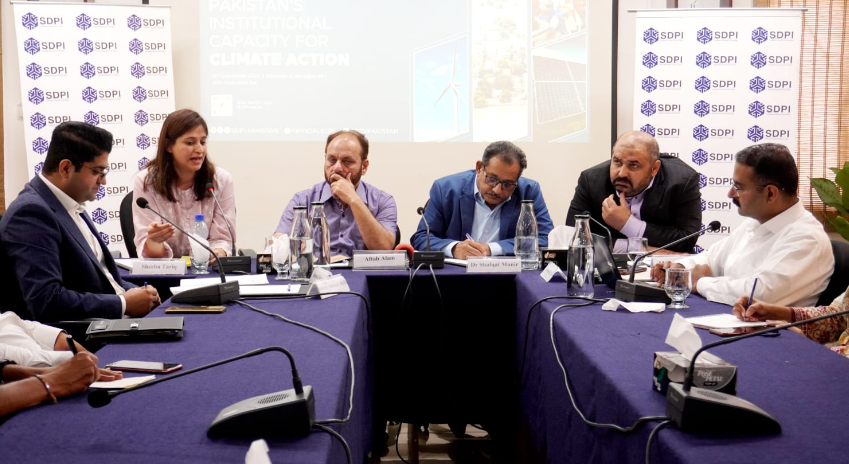ISLAMABAD, Sep 21 (APP):The speakers at a seminar on Analysis of Pakistan’s Institutional Capacity for Climate Action Thursday said the country’s climate action would be fruitless if it was not curated through harnessed institutional capacities, corrected policy endeavours, and improved coordination among the relevant department inclusive interventions to cope with environmental degradation.
The Sustainable Development Policy Institute (SDPI) organised a special seminar as part of its series of dialogues intended to stir a debate on pressing environmental issues related to the country’s efforts and achievements on climate action, global leadership for addressing global warming, climate finance and the first ever loss and damage fund declared due to the country’s ardent efforts at the previous COP-27 conference held in Sharm El-Sheikh.
Research Associate and author of one of the policy paper related to the aforementioned effort, Ahmed Awais Khaver in his opening remarks said the seminar was part of the series of seminars being held in collaboration with Oxfam Pakistan which was the second one of the four sessions to be held by the SDPI.
Deputy Executive Director, SDPI, Dr Shafqat Munir in his welcome note said the seminar was part of the pre-launch seminar series prior to the 28th meeting of the Conference of the Parties to be held in Dubai, UAE.
He mentioned that the seminar focused the 13th sustainable development goal of Climate Action (SDG-13), whereas SDG-12 (
Ensure sustainable consumption and production patterns) could not be ignored and it encompassed all climate action by emitting less through less consumption, hence reducing the carbon footprint.
He underlined that the seminar would help debate the capacities of the country to take the daunting of climate action and would help garner more ideas on this policy pape
r to prepare a better and enriched research document.
Author of the Policy Paper on Climate Action, Awais Umar, Research Associate at SDPI briefed the participants on the document that studied climate action and vulnerability of the country.
He mentioned that Pakistan made a significant contribution through policy making efforts on Climate Action-SDG-13 but lacked effective implementation.
The country, he said had Climate Change Policy 2021, an updated version of the same document promulgated in 2012. However, the provinces with a few exceptions lacked the important policy initiative to drive their efforts coherently to address climate change, he added.
Lecturer at National University of Sciences and Technology (NUST), Sheeba Tariq opined that the country needed decentralisation of disaster risk reduction (DRR) rules and regulations at the provincial and district level because the vulnerable community deemed recognition that were neglected in every policy initiative.
“Women empowerment should be part and parcel of development strategies as the current policy initiatives lacked women responsive strategies and policies which should have bottom-up approach,”
she added.
Sheeba Tariq noted that there was phaseout plan for coal-fired power plants under CPEC amid its 60% renewable energy transformation goal alongwith that the Electric Vehicle transition agenda also had no plan for lithium batteries’ disposal or waste management that was environmentally hazardous.
Deputy Manager, the National Disaster Risk Management Fund (NDRMF), Mujahid Afzal said the barrier to implementation of climate change policy in the country was finances which could not be managed from its own resources but rather possible through the international community’s support.
He highlighted that due to the demographics of the country that varied due to diverse communities, the concept of community development varied from region to region an
d therefore should be handled in separate manner in different areas of the country.
Afzal said the simulation exercises intended to bolster disaster preparedness and resilience of the local communities against disasters help prepare for the worst. He added that the forecasted floods in the future were of enormous magnitude that were far disastrous then the previous one we have been facing for the past two decades.
“The most imminent threat to the country is climate change that will leave our population out of food if its swathes of crops were washed away by mighty floods. We are left with no time to do indigenous research but to import research, test it and implement it,” he said.
CEO, Resilient Future International (RFI), Aftab Alam Khan said it was time to think beyond the Ministry of Climate Change and NDRMF for institutional capacity building as the county needed a cross-sectoral approach in terms of mitigation and loss and damage.
The role of Commerce and Ministry of Foreign Affairs (MoFA) needed to be looked into as it took many years to get international climate finance, he said, adding, “We need to have an active Commerce Ministry and MoFA as climate finance globally had a political interest attached to it.”
He referred to the third transitional committee on loss and damage fund held at Dominic Republic where one proposal from developed countries said that the less developed countries and small island countries should only get loss and damage fund which could have made Pakistan ineligible. “MoFA should have to play it’s role there as the last meeting of the transitional committee will be held in October which will send the final recommendations for COP-28 consideration,” he added.
